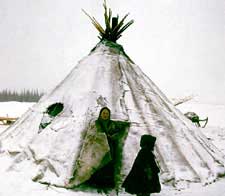Print  |
|


October 19, 2011: interview with Charles Weinstein on the Chukchi people
Retired Professor – “agrégé” – and author of “Parlons tchouktche” (Let’s speak Chukchi), Charles Weinstein answers a few questions on a community he cares for, one of the world’s most threatened, the Chukchi people.

Q: If you had to say who the Chukchi are in just a few words, for all the people who have never even heard of them, what would you say?
The Chukchi are nomadic reindeer farmers in the tundra on one side, and marine mammal hunters settled on the coasts of the Pacific and Arctic oceans on the other. Both have been encountering regularly for millennia, which explains how despite the extent of their territory, their language has remained one and the same. Former travellers have described them as a strong, proud, and assertive people.
Q: Nowadays UNESCO considers the Chukchi language as “critically” endangered, with under 10,000 speakers. But that wasn’t always the case. What was the minorization process here?
Up to the mid-20th century, all the Chukchi, children and grown-ups, spoke their language. A considerable inflow of Russian speakers occurred at the time, people arriving to work in the companies created then, largely followed by administrative staff. The local people, Chukchi, Eskimo (Yupik), and Even became minorities on their own land. The indigenous communities were gradually convinced that their language and culture were primitive. Schools structured around the Russian language. Radio, television, and the other media essentially run in Russian.
Q: The safeguard of a language implies its transmission to the younger generations, and thus, education. How does the Chukchi language stand?
Just as the people were left to themselves, the language was also left behind. A rupture occurred between the elders and the children brought up in Russian, in boarding schools. I’ve only met very few youngsters who actually knew their language. Besides, these people have serious economic issues to solve each day as it comes, and the language is no longer their main concern.
In the villages (around forty so-called “national” villages), the teaching of the language lacks both quantity and quality. The Russian local authorities see no necessity in promoting any kind of rescue policy directed at minority languages.
Q: The situation seems almost hopeless… What can still be done to save this language and culture?
We can convince the locals to think about possible measures, and the administration must leave them free to apply these measures and encourage them to do so. The dominant Russian language would not be threatened in any way. Everyone knows that the command of two languages is a source of individual enrichment. A wide group of Chukchi intellectuals could set about elaborating measures of rescue, for example organizing spoken language crash courses for adults, generalizing the exclusive use of the language in Chukchi classes at school, and gradually introducing the use of the language within other subjects (history, geography, etc.).
The language should be introduced in extra-curricular activities (songs, dance, confectioning herbals, collecting tales from the elders, handicraft, etc.). Holiday camps can also help to develop these kinds of activities including the use of the language.
The elders, still holders of the language, would be delighted to play a part in reviving their language. These and other initiatives require means that the administration should carry out. As a sign of goodwill, they could start by forbidding the massive amounts of alcohol being sold in the villages.
Q: You’re very attached to these people and their culture. What would the world lose if this language and culture ended up disappearing?
That would mean cultural impoverishment for everyone, as would the extinction of any other endangered language and culture. It would also mean that my wife and I have failed, because it would question our belief in the wisdom of mankind, in mankind’s ability to respect others.
Access Charles Weinstein’s description sheet on Chukchi language
Charles Weinstein’s website on Chukchi language and literature








